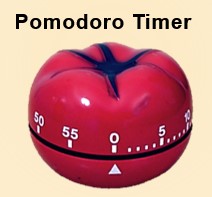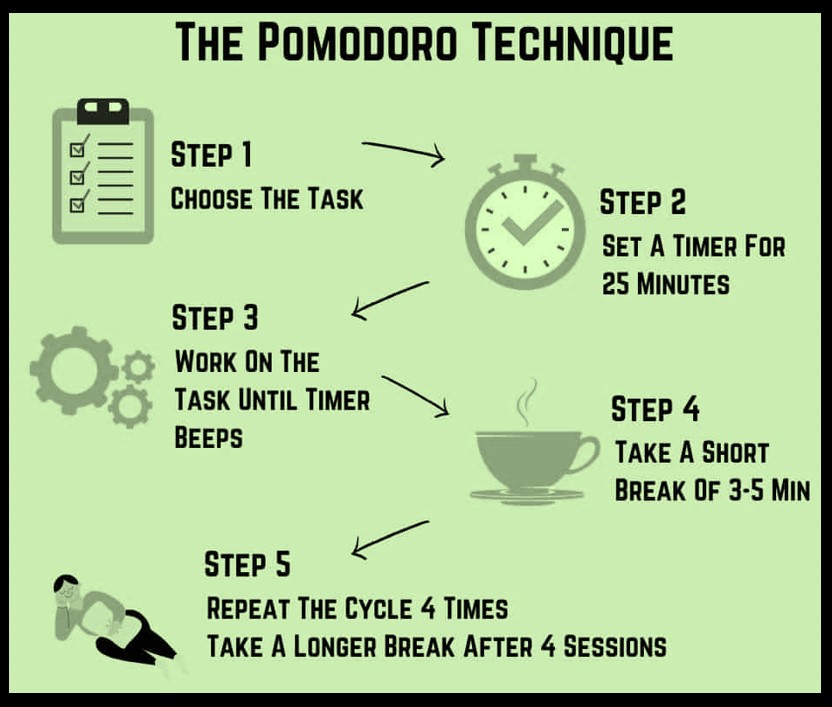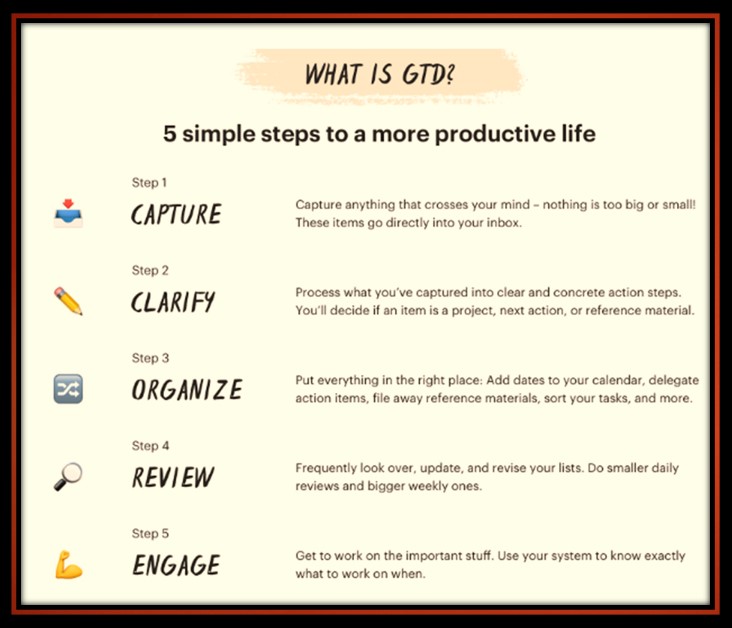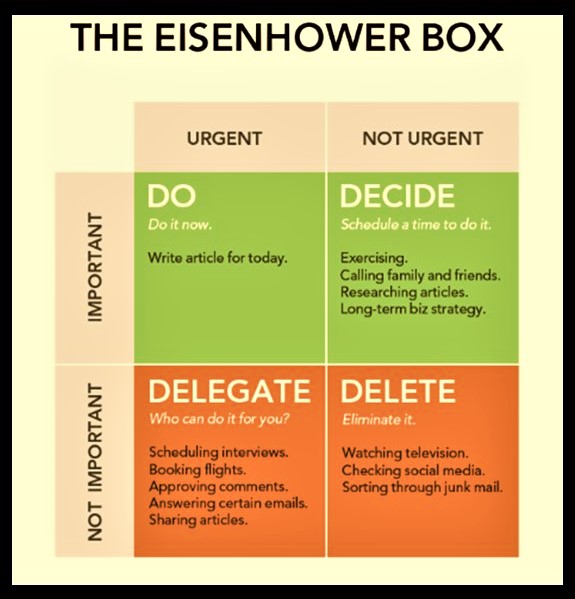
This article helps you understand the concept of time management. It gives three very successful techniques as well as some tips. Work smarter, not harder!
We all have 24-hours in a day. But, why do some people seem to achieve more with their time than others? The answer is good time management.
What is time management? Do we manage time? No! Nobody has more than 24 hours in a day. We manage our activities to make 24 hours productive. Time management is a technique for using your time more effectively.
Time management is one of the most important skills you can develop. Your time is the most valuable resource you have, and you must learn how to manage it as effectively as possible.
Benefits of good time management:
- More productivity
- Greater efficiency
- Less stress
- More satisfaction
- More success
- Better work-life balance
There are three techniques that are proven effective for efficient time management:
1.The Pomodoro Technique is a time management technique designed to help you become more productive. It was invented in the early 1990s by the developer, entrepreneur, and author Francesco Cirillo. Cirillo named the system “Pomodoro” (the Italian word for tomato) after the tomato-shaped timer he used to track his work as a university student.

The Pomodoro Technique involves breaking your tasks into 25-minute intervals and focusing on breaking these intervals down into smaller and smaller intervals of work. It helps you stay focused and on the job and prevents you from getting distracted. The Pomodoro Technique is an excellent way to become more organized and keep yourself on schedule. Being organized will also help you to become happier. This is because being organized means that you can plan your time effectively. This means that you will be able to invest your time in activities that will make you happy. This will allow you to avoid spending a lot of time on things that don’t matter, which will help you to avoid becoming depressed.

2. The GTD (Getting Things Done) technique: is a popular task management system created by productivity consultant David Allen. The methodology is based on a simple truth: The more information bouncing around inside your head, the harder it is to decide what needs attention. As a result, you spend more time thinking about your tasks than actually doing them. When information piles up in your head, it leads to stress, overwhelms, and uncertainty.

The GTD method is made up of five simple practices to get things done:
- Capture: Capture anything that crosses your mind. Nothing is too big or small! These items go directly into your inboxes. The GTD Inbox may include several inboxes: your e-mail inbox, a physical tray where you put all the pending papers, a software application in which you capture all your tasks (like Notepad, Evernote, Apple notes, task manager), etc.
- Clarify: Once you have everything collected in your inbox (or inboxes), then you can begin to process everything and make decisions about what to do with all those inputs.
- Organize: Put everything into the right place. Add dates to your calendar, delegate projects to other people, file away reference material and sort your tasks.
- Review: Frequently look over, update, and revise your lists. If you miss this step, things will pile up and it gets harder to keep up with the system.
- Engage: Now you are ready to get things done. When you consistently follow the first four steps, you will have a sense of clarity and control over your day. You can be confident that you are investing your time, energy, and attention in the right next actions. You will no longer worry about forgetting a deadline or missing an important task.
3. The “Eisenhower Box”: One of the most popular time management techniques. General Dwight D. Eisenhower invented it. This technique revolves around creating a “to-do” list every morning and crossing off each item as it is completed. This is a straightforward system, and it is one that almost anyone can use. It is a system that requires very little thought or creativity, so it is so popular.

The box will help you to separate your actions based on four possibilities.:
- Urgent and important (tasks you will do immediately).
- Important, but not urgent (tasks you will schedule to do later).
- Urgent, but not important (tasks you will delegate to someone else).
- Neither urgent nor important (tasks that you will eliminate).
Tips:
- Track down your time: the first step is to find out where you spend your time. When you track down how much time you spend doing certain things, you will find out what is stealing your time. It will help you to make appropriate adjustments with your time.
- Start your day early. Ask successful people what time they get up in the morning. Apple CEO gets up at 5 a.m. Oprah wakes up at 6 a.m. to meditate and run on the treadmill before heading to the studio.
- It is very common to think that multitasking is the most efficient use of time. But this is not true. Tackling more than one thing at once can waste more time.
- Treat your time like it is money. Create a time budget that details how you spend your hours during a typical week. Categorize time into fixed time (“must do’s”) and discretionary time (“want to do’s”).
- Start with small goals that are achievable and measurable. Example: I am going to work out for 10 min every day.
- Set a time limit: Setting a time limit for each task keeps you away from procrastinating. For example, set the time for checking emails to 30 minutes a day.
- Prioritize wisely. Example: I will turn off social media notifications while I am focusing on work.
- Set an urgency on completing your task. It takes us longer to complete a task when we think we have time, so start by shortening the time frame. Example: I have to finish reading my book in 3 days.
- Make to-do lists: This helps you prioritize your tasks but not abandon them. You may have to limit the number of tasks you are working on at a given time.
- Make a plan: If you do not have a plan for the day, you might wander aimlessly instead of focusing on what needs to be done. The night before, compose a list of your most important items for tomorrow. It will give you time if you need to do any pre preparations.
- Plan for two reasons for the most important and most challenging tasks in the morning. One is you are more energetic in the morning. And the second is the feeling of accomplishment that helps get through the rest of the day.
- Perseverance: Put continuous efforts. Do not leave half work. It is very easy to get distracted and leave the task halfway. When you go back to finish the incomplete task, it may take double the time as you were not fully engaged with that task initially. The best way is to focus on one project and eliminate everything else.
- Plan and Organize. Every first day of the month or week, plan the most important goals you want to accomplish, write them down and make them visible. Set calendar reminders for an important task that is due. Consider it as a meeting with yourself. If it is due on Wednesday, set 3 reminders; one week in advance, three days in advance, and a day in advance.
- Always make time for yourself and what makes you happy. Spend a minimum of 30 min a day for self-care. Dedicate it to working out, reading a book, manicure or pedicure, visiting a friend, playing with your kids, dancing, and whatever makes you relaxed and happy.
- Different tasks demand different types of thinking and arrangement. It would be intelligent to batch them together instead of hopping from one task to another mindlessly. For example, you can designate a specific time to answer emails and phone calls rather than doing them throughout the day.
Take home message: Do not work hard; work smart! Time management is a must!

very usefull time management article
Thank you, Seema. Many people had requested to write on this topic. Finally, did some time management to write the article on Time management:)
Khup chan mahiti ahe great for you
Thank you for your constant support 🙂
Very interesting and useful article.
Hopefully, some of the tips are useful to you 🙂
Dr Savitra, wonderful development by you in medical, writing work and food preparation within your such busy schedule, you are really the great, we all Degloorkars are proud of you, keep it up.
Thank you so much for taking time to write the feedback. माहेरच्या माणसांकडून कौतुकाची थाप मिळणे अधिक आनंददायक असते.
So this “ time management “is secret behind your multitasking and doing each task with perfection & commitment..and no wonder, success follows you; and so we all readers follow you ☺️.!!
Keep it up.!! 👍🏻
हा..हा..हा..सही पकडे 😉 Thank you, dear!
Good to know great work! Savi
Thank you, Dr Ming 🙂